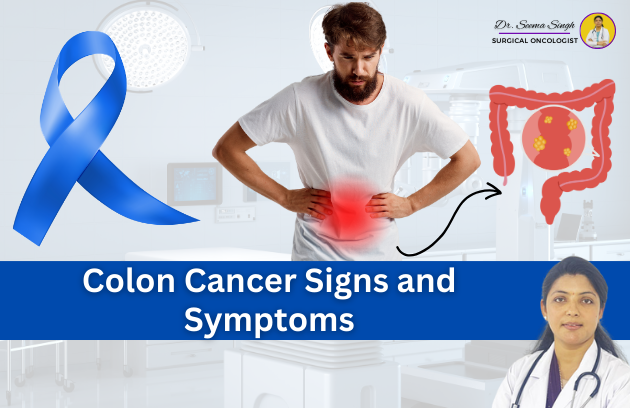- January 24, 2024
- Dr Seema Singh
- Comment: 0
- Uncategorized
What is Colon Cancer?
Colon cancer, also known as colorectal cancer, begins in the colon, which is the large intestine responsible for moving digested food to the rectum and out of the body.
It forms from abnormal growths called polyps in the colon’s inner lining. Healthcare professionals use screening tests to find these precancerous polyps early, preventing them from turning into cancerous tumours. If left untreated, colon cancer can spread to other parts of the body. Fortunately, with screening tests, early treatment, and new treatment options, fewer people are losing their lives to colon cancer.
Symptoms of Colon Cancer
Symptoms of colon cancer can sometimes go unnoticed, but when they do appear, they might resemble those of other, less serious conditions. Here are some common signs:
Blood in or on your stool:
If you see blood after using the toilet or notice a change in the colour of your stool, it’s essential to speak with a healthcare provider. While blood in your stool doesn’t automatically mean colon cancer, it’s wise to get it checked out.
Changes in bowel habits:
Persistent constipation, diarrhea, or a feeling of incomplete bowel movements should prompt a conversation with a healthcare provider.
Abdominal pain:
If you experience unexplained belly pain that doesn’t improve or becomes severe, it’s important to seek medical advice.
Abdominal bloating:
While many factors can cause bloating, prolonged or worsening bloating, especially coupled with other symptoms like vomiting or blood in your stool, warrants a consultation with a healthcare provider.
Unexplained weight loss:
Losing weight without trying could be a sign of an underlying issue, including colon cancer.
Vomiting:
If you’re vomiting without an apparent cause or if it’s frequent, it’s worth discussing with a healthcare provider.
Fatigue and shortness of breath:
These symptoms could indicate anemia, which may be linked to colon cancer. If you’re experiencing these symptoms, it’s essential to seek medical attention.
Lifestyle choices that are risk factors for colon cancer
- Smoking: Using tobacco products, including chewing tobacco and e-cigarettes, increases your risk of developing colon cancer.
- Excessive alcohol use: In general, men and people AMAB should limit beverages containing alcohol to two servings a day. Women and people AFAB should limit beverages containing alcohol to one serving a day. Even light alcohol use can increase your risk of developing cancer.
- Having obesity: Eating high-fat, high-calorie foods may affect your weight and increase your risk of colon cancer.
- Having a diet that includes lots of red meat and processed meat: Processed meat includes bacon sausage and lunchmeat. Healthcare providers recommend you limit red meat and processed meat to two servings a week.
- Not exercising: Any kind of physical activity may reduce your risk of developing colon cancer.
When to consult with a Colon Cancer Specialist
Follow-up colon cancer care varies depending on the cancer stage. For example, people who have surgery for Stage 0 or Stage I colon cancer may have a colonoscopy one year after surgery, another colonoscopy three years after surgery and a third five years after surgery.
Unless the follow-up colonoscopies find signs of cancer, someone with Stage 0 or Stage 1 colon cancer may be able to wait several more years before having another colonoscopy.
People successfully treated for Stage II or Stage III colon cancer will need to see their healthcare provider every three to six months for the first two years after treatment and are typically followed for five years from surgery. They may have tests including colonoscopies, CEA blood tests and imaging tests.
Anyone recovering from colon cancer treatment should contact their healthcare provider if they notice changes that may indicate the cancer has come back or is spreading. If you are looking for a colon cancer specialist in Ghaziabad then you can consult with Dr. Seema Singh who is a certified Robotic Cancer Surgeon, working at Yashoda Super Speciality Hospitals, Kaushambi Ghaziabad.


